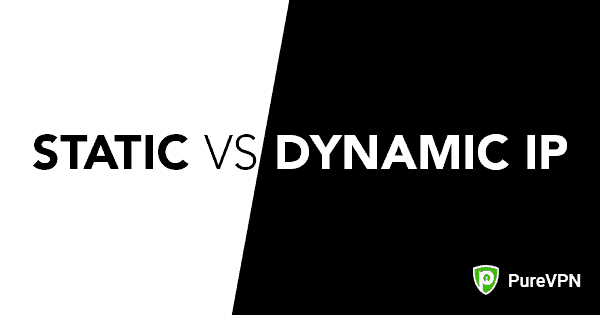The popularity of Virtual Private Networks (commonly referred to as VPNs) has been on the rise in the last decade or so. After all, these tools enable users to hide their IP addresses for complete privacy and freedom on the web.
If you’re one of the millions of people who use a VPN for whatever reason, you might have wondered somewhere down the line, “What type of IP address my VPN provider has assigned me?” Well, you don’t have just one choice.
There are two main types of IP addresses that you can obtain from your VPN, namely static (or dedicated) IP address and dynamic (or shared) IP address. In this article, we’ll take a closer look at static vs. dynamic IP addresses and what sets them both apart:
What happens to your IP address when you connect to a VPN?
When you connect your device (such as computers, smartphones, and tablets, etc.) to a VPN before using the Internet, your original Internet Protocol (IP) address gets replaced with one from the VPN server you selected.
This allows you to assume the location of that server, which not only helps you get around geo-locks on websites and specific content but also makes you anonymous as your online activities can’t be traced back to you.
What is a Static IP Address?
As the name implies, a static IP address is one that stays constant every time you go online. When you access the Internet on your device, you’ll be assigned a fixed, dedicated IP address by your VPN provider.
This means that whenever you connect to the Internet using your VPN service, it will always use the same static IP address – rather than a changing (dynamic) one.
Not all VPNs out there offer static IP addresses to their users, but you can get one from selected providers, such as yours truly, as a premium add-on.
What is a Dynamic IP Address?
A dynamic IP address is one that renews every time you go online. When you connect to the Internet on your device, you’ll be assigned a random, unique IP address by your VPN provider.
So, every time you access the Internet through your VPN service, you will always get a different IP address – rather than one that remains the same (static).
Dynamic IP addresses are the default IP method for most VPN providers today as they’re cheaper and provide better anonymity.
Is it Better to Have a Static IP or Dynamic IP?
Below, we have highlighted some pros and cons of using static vs. dynamic IPs so that you can decide which one is best suited for your needs:
Static IP
Pros:
- If you want to use your computer from a remote location, it’s a straightforward process with a static IP address.
- Since you’re the only one associated with your IP address, you might experience faster download and upload speeds.
- You can avoid constant authentication requests when gaming or using certain services like online banking.
Cons:
- The IP address is yours alone, which is why linking your online activities back to you is somewhat easier.
- dedicated IPs are often more expensive than their counterparts, so you might have to pay more for these services.
Dynamic IP
Pros:
- Because your IP address is changing from time to time, you achieve a better degree of anonymity on the Internet.
- Dynamic IP addresses are cost-effective to obtain, and VPN providers that offer them are most likely to have budget-friendly subscription plans.
- If you want to get registered as a new user on a specific app or website, having a dynamic IP address is useful.
Cons:
- You might experience slower connection speeds, but it’s worth mentioning that most paid VPNs have workarounds for this.
- The IP address isn’t exclusive to you, and you’ll keep being assigned a new one whenever you use the Internet.
How do I know if my IP is static or dynamic?
There are three ways to find out if your IP address is static or dynamic:
Method 1:
You can contact your VPN provider directly via email or phone and ask them directly if you’re using an external dedicated or dynamic IP address.
Method 2:
- Check your current IP address by using an IP lookup tool like What is my IP.
- Note down the IP address displayed to you somewhere.
- Then, restart your router and recheck your IP address.
- If it changes, you’re using a dynamic IP address. But if it doesn’t, you’re using a dedicated IP address.
Method 3:
- Type “cmd” in the search box and open Command Prompt.
- Now, enter the command “ipconfig/all” and hit the Enter
- Scroll down a bit and find DHCP Enabled.
- If it says “No,” your IP address will be static. But if it says “Yes,” your IP address will be dynamic.
Why Would You Need a Static IP Address?
Using a static IP address is necessary if you want to:
1. Host an FTP or Web Server
The advantages of static IPs are many. However, one of the biggest is that computers using a dedicated IP address can host servers, such as file and web servers, which can be accessed by other computers over the Internet. This type of IP address makes it easier for computers to find and connect to the server, regardless of where they’re located.
2. Stop Unwarranted Traffic via IP Whitelisting
Even though BYOD (Bring Your Device) and remote working have given employees the flexibility to be more productive, it’s important to realize that they also leave your business exposed to various security threats. With IP whitelisting, you can restrict access to corporate digital assets and limit them to known IP addresses only. However, you’ll need static IP addresses for this!
3. Access Your Computer from Anywhere
When you’re using a static IP address, you can easily access your computer remotely – as long as it’s active and connected to the Internet, of course. This makes it easier to access your information, work on important projects while traveling, and stay in communication with your friends, family, and colleagues from anywhere in the world.
Learn more about how to access your computer
4. Browse Uninterruptedly on the Web
Using a static IP address will often alleviate frustration. How do you ask? That’s because some websites straightaway block dynamic (shared) IP addresses or will ask for additional authentication to confirm your real identity. However, you’ll be able to enjoy a seamless online experience if you’re browsing behind a static IP.
5. Secure Your Online Banking
If you’re one of those people who do most of their banking activities online, then it’s quite obvious that you wouldn’t want cybercriminals to get their hands on your confidential information. By getting yourself a static IP address, you can secure your online banking account by only allowing your IP to gain access to it.



